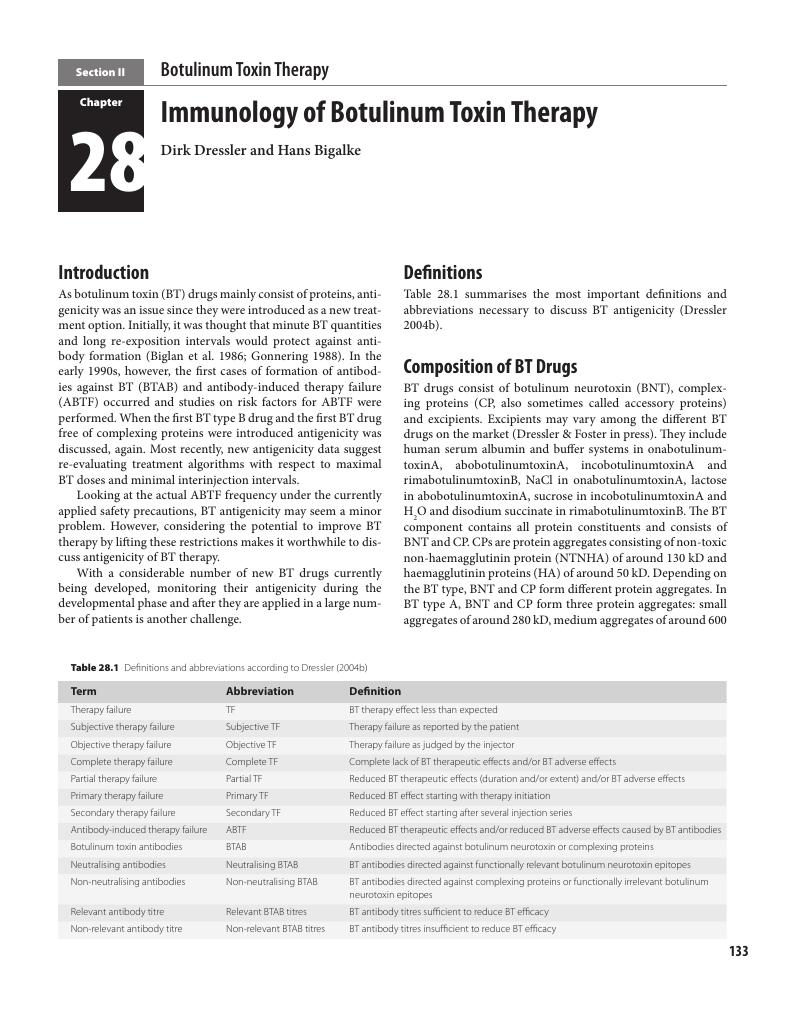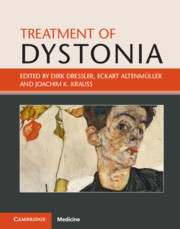Book contents
- Treatment of Dystonia
- Treatment of Dystonia
- Copyright page
- Contents
- Contributors
- Preface
- 1 Development of the Concept of Dystonia as a Disease, a Syndrome and a Movement Phenomenology
- Section I Basics
- Section II Botulinum Toxin Therapy
- 21 The Global Market for Botulinum Toxin
- 22 Molecular Mechanisms of Botulinum Toxin
- 23 Indirect Central Nervous System Effects of Botulinum Toxin
- 24 Direct Central Nervous System Effects of Botulinum Neurotoxin
- 25 Analgesic Effects of Botulinum Toxins
- 26 Manufacture of Commercial Botulinum Neurotoxins for Human Treatment
- 27 Pharmacology of Botulinum Toxins
- 28 Immunology of Botulinum Toxin Therapy
- 29 Use of Non-A/Non-B Botulinum Toxins
- 30 Clinical Muscular Anatomy for the Botulinum Toxin Injector
- 31 Ultrasound Guidance for Botulinum Toxin Application
- 32 Treatment Algorithms and Injection Schemes for Botulinum Toxin Therapy of Dystonia
- 33 Botulinum Toxin Therapy for Cervical Dystonia
- 34 Botulinum Toxin Therapy for Cranial Dystonia
- 35 Botulinum Toxin Therapy for Spasmodic Dysphonia
- 36 Botulinum Toxin Therapy for Writer’s Cramp and Other Focal Hand Dystonias
- 37 Botulinum Toxin Therapy for Bruxism
- 38 Treatment of Blepharospasm With Eyelid-Opening Apraxia
- 39 Organisation of a Botulinum Toxin Clinic
- Section III Musician’s Dystonia
- Section IV Psychogenic Dystonia
- Section V Treatment of Paediatric Dystonia
- Section VI Rehabilitation of Dystonia
- Section VII Pharmacotherapy for Dystonia
- Section VIII Surgical Treatment of Dystonia
- Section IX Deep Brain Stimulation for Dystonia
- Section X Emerging Therapies for Dystonia
- Section XI Future Trends in Dystonia Therapy
- Book part
- Index
- References
28 - Immunology of Botulinum Toxin Therapy
from Section II - Botulinum Toxin Therapy
Published online by Cambridge University Press: 31 May 2018
- Treatment of Dystonia
- Treatment of Dystonia
- Copyright page
- Contents
- Contributors
- Preface
- 1 Development of the Concept of Dystonia as a Disease, a Syndrome and a Movement Phenomenology
- Section I Basics
- Section II Botulinum Toxin Therapy
- 21 The Global Market for Botulinum Toxin
- 22 Molecular Mechanisms of Botulinum Toxin
- 23 Indirect Central Nervous System Effects of Botulinum Toxin
- 24 Direct Central Nervous System Effects of Botulinum Neurotoxin
- 25 Analgesic Effects of Botulinum Toxins
- 26 Manufacture of Commercial Botulinum Neurotoxins for Human Treatment
- 27 Pharmacology of Botulinum Toxins
- 28 Immunology of Botulinum Toxin Therapy
- 29 Use of Non-A/Non-B Botulinum Toxins
- 30 Clinical Muscular Anatomy for the Botulinum Toxin Injector
- 31 Ultrasound Guidance for Botulinum Toxin Application
- 32 Treatment Algorithms and Injection Schemes for Botulinum Toxin Therapy of Dystonia
- 33 Botulinum Toxin Therapy for Cervical Dystonia
- 34 Botulinum Toxin Therapy for Cranial Dystonia
- 35 Botulinum Toxin Therapy for Spasmodic Dysphonia
- 36 Botulinum Toxin Therapy for Writer’s Cramp and Other Focal Hand Dystonias
- 37 Botulinum Toxin Therapy for Bruxism
- 38 Treatment of Blepharospasm With Eyelid-Opening Apraxia
- 39 Organisation of a Botulinum Toxin Clinic
- Section III Musician’s Dystonia
- Section IV Psychogenic Dystonia
- Section V Treatment of Paediatric Dystonia
- Section VI Rehabilitation of Dystonia
- Section VII Pharmacotherapy for Dystonia
- Section VIII Surgical Treatment of Dystonia
- Section IX Deep Brain Stimulation for Dystonia
- Section X Emerging Therapies for Dystonia
- Section XI Future Trends in Dystonia Therapy
- Book part
- Index
- References
Summary

- Type
- Chapter
- Information
- Treatment of Dystonia , pp. 133 - 136Publisher: Cambridge University PressPrint publication year: 2018



